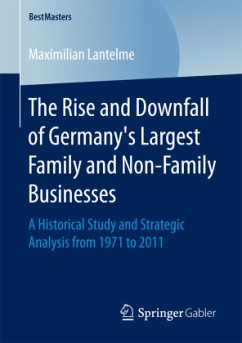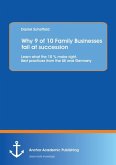Maximilian Lantelme examines the historical growth and decline developments of large German family and non-family businesses between 1971 and 2011. Based on a sample of the 143 largest German companies in 1971 and in 2011, the author investigates the long-term development of each company and calculates compound annual growth rates (CAGR) to compare the developments of total sales and of the number of employees between the enterprises with the overall development of the German economy. Additionally, he presents the exit rates as well as the reasons for the downfalls of the different types of companies. The results show a superior development of family businesses especially compared to non-family businesses due to lower exit and higher growth rates. The strategic implications are that family businesses should achieve a certain corridor of growth in the long-term to secure the company's existence over generations.
Bitte wählen Sie Ihr Anliegen aus.
Rechnungen
Retourenschein anfordern
Bestellstatus
Storno








